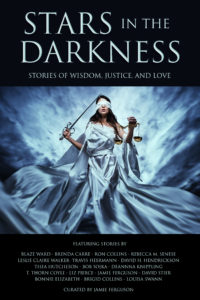
“Judging Pashet” is in the Stars in the Darkness anthology, a collection of stories about why being just matters, and what the ramifications are for individuals, groups, towns, countries, or even worlds if justice is not expected, encouraged, or enforced.
Meet Thea!
Thea Hutcheson writes about magic, science, and everything in between. She has a special love for ancient cultures, and captured the essence of ancient Egypt and the impact of flooding – or lack thereof – of the Nile River on people’s lives in “Judging Pashet.”
“Judging Pashet”
In the time of the ancient pharaohs, the great annual flood of the Nile has not come to make the black soil fertile. Princes fight for power after the death of the pharaoh, blockading the boats that carry precious food up and down the river. Starvation faces Mert, her family, and her village unless she finds a way to render judgment on a dead man and make him pay for his crimes.
…
The stone floor was cool under her bare feet and the breeze from the opening swirled fresh air around her legs. Her heart pounded so loudly she could hear it in her ears. The horror of the crime she was committing made her hands tremble. Her breath harsh and loud in the silence of the tomb. She lifted the lamp and gasped.
The walls sported richly painted scenes of Pashet at his ease, receiving tribute, supping with Osiris.
The conceit of the man went beyond her understanding. She looked among the grave goods. Fine ebon chairs nestled against one another in a corner, ivory bracelets spilled across a carved box, and mounds of sheepskins, stacks of copper ingots, rolls of woven fabric, and tens of bronze oxen leaned against the walls.
And yes, baskets of bread, jars of beer, bags of seeds, pots of dates, honey, and almonds made an open ring around the sarcophagus.
– from “Judging Pashet”
The Interview
What inspired you to write “Judging Pashet?”
I love ancient cultures, especially Middle Eastern cultures. I have a book of Egyptian document translations and a lot of them are judgments of civil disputes. I found that priestesses were often called upon to hear testimony and render judgments, and I wanted to find out what Mert would do in the face of impossible odds and inestimable hubris.
How does “Judging Pashet” fit the Stars in the Darkness anthology?
A small village is suffering as a civil war rages for control of the crown, blockading the Nile river so that supplies have not reached them. The river has also not flooded yet, keeping them from planting. The villagers file a complaint against Pashet, the wealthy man who was responsible for the welfare of the village, who had been abusing them and failing in his responsibilities. As the designated judge in the matter of the villagers’ complaints against him, Mert is charged with finding a resolution. But he dies before she can render judgment, and she must find a way to mete out justice against a dead man and provide restitution to the villagers from his estate. Mert, who also lives in the village and sees her son suffer as a result of this man’s behavior, finds herself in an impossible situation when the needs of the mortal world and the requirements of the spiritual world clash. Her answer shows the selflessness of true justice.
Your protagonist breaks the rules to save people, knowing doing so would have repercussions for her personally. Why did you decide to put this in your story?
Ancient Egyptians had a highly developed sense of right and wrong and balancing the scales in both the mortal world and the hereafter. I wanted to explore mortal needs in direct opposition against spiritual laws.
Why did you set the story in Egypt, and why in this particular time?
I was bitten by the ancient civilization bug at the tender age of seven. I love all those Middle Eastern cultures. Egypt was a highly civilized and structured society, and I loved the idea of working in this part of the world. This particular time in history was very exciting. The death of a beloved ruler led to a dire struggle to fill the vacuum. It was exciting and a wonderful set up for the story’s conflict.
I had to do a diorama in the seventh grade for World History. I chose to do a mummy. I wrapped my Barbie doll in strips of an old sheet, working hard to create the patterns I saw on Victorian photographs. I painted a shoe box for the sarcophagus and several olive and lotion bottle jars for the canopic jars. I placed my pharaoh in the sarcophagus and filled the jars with dry dog food and put water in them (I hadn’t learned they dried the organs) and made a display. I got an A, of course, but my mother made me throw the jars away, unopened.
This was an opportunity to tell a story straight from my heart and the core of my interests. It’s also a bigger, better version of that first diorama, all fleshed out.
Why did ancient Egyptians put food in their tombs?
The Egyptians believed in the “as below, so above” philosophy. In other words, whatever you needed in the mortal world, you would want in the hereafter. So you would need food, plates, pets, servants, a chariot, your boat—all the trappings of a comfortable life. Unfortunately, even with all the elaborate precautions, many tombs were plundered, often almost immediately after they were sealed.
Several goddesses are mentioned in your story. Who are they, and why were they important to your protagonist?
Ipet is the hippo-headed goddess of childbirth. While male hippopotamus are vicious and are symbolic of chaos, females are exceptionally nurturing mothers. They represent the fierce caring required to carry a child to term, deliver the infant successfully, and nurture them in the face of terrible odds at all stages.
Maat represents justice, truth, honesty. She is often depicted with wings and often has an ostrich feather in her headband. That is the feather that is laid on the scale that Anubis, the god of the dead, holds when the soul is called to judgment. If the heart is heavier than the ostrich feather, the person has failed in their moral life, and is eaten by Ammit and can never live again.
Isis is the daughter of heaven and Earth. She is the wife of Osiris, who was killed and dismembered by his brother Set. She is also the mother of Horus.
What story (or stories) are you working on now, and what’s fun about what you’re writing?
I am working on a time travel series. There is some romance in them as the story unfolds and the characters are brought together, ultimately to be a team. The Bee Lady’s Amulet is the first in the series and follows Melinda, a woman in modern times, who walks through a doorway in an ancient Cretan ruin and finds herself face to face with a goddess who gives her a mission to save people from the destruction of Santorini. The people she meets believe she is the emissary of the goddess and set about planning how to effect the salvation. She thinks that her mission is over when she delivers the message, and is frustrated to find out things are more complicated for her, especially when she finds herself falling into an impossible romance with the earthly husband to Askar, the Cretan goddess. She doesn’t want to stay with him in this ancient culture, but she is heartbroken to know that she will leave and lose him.
The next story features a modern man thrust back into the same time period with instructions from that same goddess to save a witch from the eruption of Santorini. He is young enough to still be discovering who he is, and is thrust into a completely foreign world that he is ill-equipped to navigate. In the course of learning to survive, he meets the woman he is to rescue, and finds that she is not what she thought he was, and all of his beliefs about magic and realism are shifted once again as he falls in love with her.
The third book requires all four of them to work together for the first time on a mission that is endangered by a group committed to anarchy, and which opposes the goddess’ efforts to protect aspects of her creation. In that cauldron the four will face culture shock, the meaning of their relationships, and their commitment to the goddess’ wishes.
…
Thea Hutcheson explores far away lands full of magic and science with one hand holding hope and the other full of wonder. Lois Tilton of Locus called her work “sensual, fertile, with seed quickening on every page. Well done…” Her work has appeared in such places as Hot Blood, Fatal Attractions, M-Brane, Baen’s Universe, the Beauty and the Beast Issue of The Enchanted Conversation, Realms of Fantasy, and several volumes of the Fiction River anthology series. She lives in an economically depressed, unscenic, nearly historic small city in Colorado with four semi-feral cats, 1000 books, and an understanding partner. She’s a factotum when she’s filling the time between bouts at the computer.
…
 Stars in the Darkness is a collection of stories about why being just matters, and what the ramifications are for individuals, groups, towns, countries, or even worlds if justice is not expected, encouraged, or enforced.
Stars in the Darkness is a collection of stories about why being just matters, and what the ramifications are for individuals, groups, towns, countries, or even worlds if justice is not expected, encouraged, or enforced.
All proceeds from this collection will be donated to the Southern Poverty Law Center and the Human Rights Campaign.

